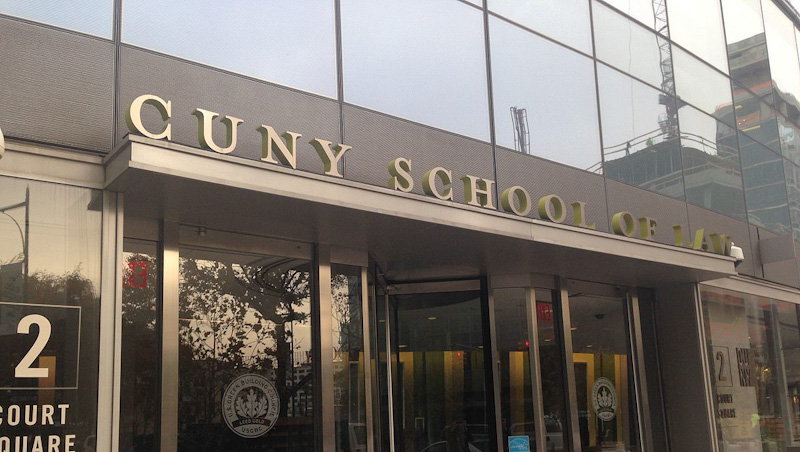As culture wars continue, City University of New York School of Law is latest target

The City University of New York School of Law in November 2015. Photo by Evulaj90, CC-BY-SA-4.0, via Wikimedia Commons.
A May commencement speech given by a City University of New York School of Law graduate, who criticized Israel and law enforcement, was met with applause. But by the end of the month, she was on the cover of the New York Post with a headline that read: “Stark raving grad.”
The story was published online May 29 and in print May 30. Also on May 30, CUNY’s board of trustees and chancellor tweeted a statement describing some of 2023 graduate Fatima Mohammed’s remarks as hate speech.
Next came articles from Al Jazeera, the National Review and the New York Times, as well as a column by Eugene Volokh of the Volokh Conspiracy, who’s also a professor at the University of California at Los Angeles School of Law. The First Amendment scholar wrote that people may think that a speech like Mohammed’s wasn’t suitable for a commencement ceremony, but what she said was an exercise of free speech.
The law school is one of many in the past year to have bad press days, or perhaps bad press weeks, following student activities involving sensitive topics. That includes law schools at Stanford University, the University of Idaho, the University of California at Berkeley and the Georgetown University Law Center.
“It’s one thing for a story to be making the rounds on Twitter. But when a student hits the front page of the New York Post, it shows that for all the people who say that the mainstream press is dead, it’s not,” says Evan Nierman, the founder and CEO of the crisis PR company Red Banyan.
Nierman also co-wrote The Cancel Culture Curse: From Rage to Redemption in a World Gone Mad. According to him, cancel culture thrives on people who want to create controversy and get more likes and shares on social media.
Most universities want to see graduation speakers’ remarks before the event, but there’s no guarantee that the speaker will stay on script, according to Nierman. If Mohammed’s speech was vetted by the university before the ceremony, it should have set off “loads of alarm bells, and a sea of red flags,” he adds.
She was one of two class of 2023 commencement speakers, and both were selected by classmates, according to the CUNY School of Law’s website.
The school’s Jewish Law Students Association tweeted a statement supporting Mohammed. A representative from the group told the ABA Journal that she has decided to not speak to the media because of threats that she and her family received.
The university’s director of communications and marketing told the Journal that the law school had no comment on the matter, and its dean, Sudha Setty, was not available for comment.
Erwin Chemerinsky, the dean of University of California at Berkeley School of Law and a Journal contributor, says it would never occur to him to vet a student’s speech.
“I would not want to engage in that kind of censorship,” he explains.
Chemerinsky has a slightly different experience with his school going viral. Rather than getting pushback for what someone said, it attracted global attention after various law school groups adopted provisions that they would not invite, host or promote speakers who supported Zionism.
Among other things, the situation brought what Chemerinsky refers to as the “Barbra Streisand incident.” The celebrity seen by many as one of the most influential singers in the world tweeted: “When does anti-Zionism bleed into broad antisemitism?”—with a link to a story in the Jewish Journal criticizing the law school.
The article included Chemerinsky’s response, which was that student groups and events on campus must be open for all students. Chemerinsky closed with the idea that free speech rights for students are important—even if he and others found their messages offensive.



